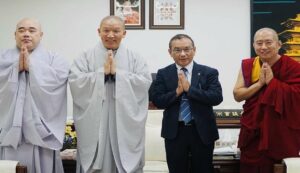Dalai Lama’s representative Tsewang Gyalpo Arya completes his official visit to the Philippines
Tokyo: As he concluded his formal trip to the Philippines, Tsewang Gyalpo Arya, the Dalai Lama’s envoy to Japan and East Asia, emphasized the continuous fight for Tibetan autonomy and human rights. In keeping with the Philippines’ longstanding support for Tibet’s struggle for independence since the 1960s, Arya’s visit included talks and debates focused on the Tibetan question, according to a news statement from the Central Tibetan Administration.

In a discussion with Congressman Adrian Amatong, Arya emphasized the importance of the recently passed U.S. Resolve Tibet Act and urged the Philippine parliament to enact like legislation. Since many Filipinos identify with Tibet’s nonviolent fight for justice and independence, he emphasized the need for spreading knowledge of the Tibetan predicament. Amatong concurred, stating that Tibet’s goals and the Filipino spirit of liberation are quite similar.
According to CTA, Arya also spoke with Wallace Chow, who represents the Taipei Economic & Cultural Office, on how democracy and freedom are intertwined in addressing Tibet, Taiwan, and China-related problems. Both delegates reaffirmed their common commitment to aiding oppressed people by expressing unity in advancing these principles across the world.
Arya sought to increase worldwide support for Tibet via these contacts, calling for sustained campaigning and diplomatic efforts to resolve the continuing dispute with China. His visit served as a reminder of how crucial teamwork is in the worldwide struggle for autonomy and human rights.
The political, cultural, and human rights issues that Tibet has faced, especially after joining the People’s Republic of China in 1950, are at the center of the Tibetan question. The 14th Dalai Lama became a symbol of the fight for Tibetan autonomy and rights after the annexation drove the Tibetan administration into exile.
There have been many claims of cultural repression, religious repression, and violations of human rights, including limitations on language and spiritual activities, as a result of the Chinese government’s allegedly stringent control over the area. China insists that Tibet is an integral part of the country, despite the fact that many Tibetans and foreign proponents want true autonomy or independence. As many nations balance their diplomatic ties with China while addressing human rights issues in Tibet, this continuous battle has a substantial impact on international politics in addition to the lives of Tibetans.





